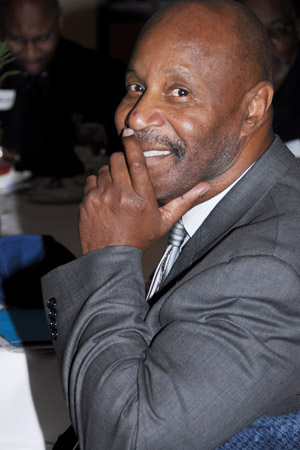Tyrone Parker
Tyrone Curtis Parker comes from neighborhoods of Washington, D.C. worlds away from the White House. When he was growing up, in spite of racism and poverty, a sense of community sustained people in those neighborhoods. Today, Tyrone is trying to restore that sense of community to those neighborhoods—demanding work that at any moment might cost him his life.
Raised by a hard-working single mother, Tyrone had early brushes with the law. In 1966, he was convicted of bank robbery and went from high school to prison. In prison, he became involved in community service projects that helped him acquire a “reservoir of different concepts.” He eventually won parole—but not yet freedom: he will remain on parole until 2013.
When Tyrone was released from prison in 1987, he returned home to a “killing epidemic,” where violence was the rule, not the exception it had been in his youth. In 1989, Tyrone’s son, a rising star in the D.C. music world, was slain by a stray bullet—an innocent bystander to a gun fight at a skating rink. No one was safe from flying bullets—not the elderly on their way to church, not the children playing in the street, not the young men desperate for respect and a piece of America’s pie. The sense of community that he had grown up with was itself in danger of being killed off.
Rather than keep doing the traditional community service work he’d started in prison, Tyrone and four old friends from high school—1997 Petra Fellow Rahim Jenkins, Joe Nelson, Eric Johnson and James Alsobrooks—formed the Alliance of Concerned Men and sought to staunch the bloodshed at its source—in the deadly neighborhoods of Washington. Armed only with their street-smarts, they became volunteer peacemakers, improvising strategies as they stepped onto blood-stained pavement.
The Alliance confronts street violence on a person-to-person level: “I always say, if somebody started it, then somebody can end it.” Since 1991, Tyrone and the Alliance have brokered truces in Washington’s gang-plagued neighborhoods, earning; trust ina world that is “like a complex maze” in which one street-corner gang may have several different-minded crew members. Tyrone and Alliance mediators seek out the killers and the vengeful, confront Uzi-packing street leaders, settle disputes, and work to provide paths out of crime and violence.
Beyond its emergency gang interventions, Alliance programs serve about 300 kids a day. Operating on the premise that every individual has infinite worth and dignity, the Alliance takes a comprehensive approach to creating social justice, sponsoring programs on substance abuse, life skills training, post-incarceration and after school programs. It does so with fewer than a dozen full time staffers augmented by some 75 volunteers. In the last few years, groups from other American cities, and from Russia, Northern Ireland, and Brazil, have reached out to the Alliance for help in combating their own gang violence problems.
But the heart of the Alliance work is in the streets of America’s capital city. They are out there today, they are out there tonight. “If you’ve got the will and the spirit to go, then usually everything falls into place. It all comes down to who’s willing to go,” Tyrone says. “If we don’t go, people lose their lives.”
 Photo by Deena Corland
Photo by Deena Corland